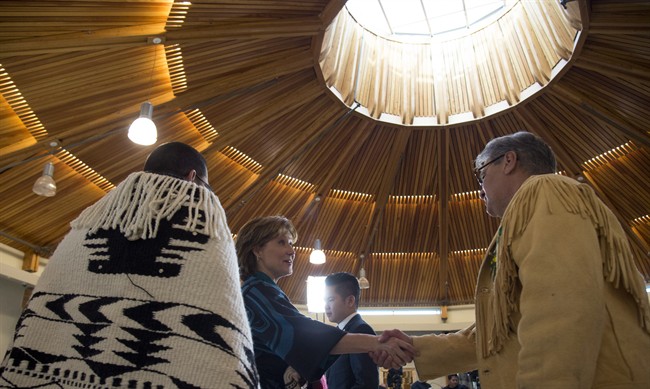VANCOUVER – A final report from a special adviser on indigenous children in care in British Columbia offers 85 recommendations on how to overhaul the aboriginal child-welfare system in the province.

Grand Chief Ed John’s report calls for reducing the need for indigenous kids and youth to come into care, increasing support services that help keep families together and enabling greater access to legal services.
It also urges a more equitable funding formula between the province and federal government, an increase in early intervention services and more ministry staff for First Nations communities.
The portion of aboriginal kids in B.C. care has increased over the past decade, from 50 per cent in 2006 to 61 per cent this year, and Premier Christy Clark’s government has faced fierce criticism on the issue.
Last year, B.C.’s representative of children and youth released a report that blamed the overdose death of a legally-blind aboriginal girl on “professional indifference.”
After an aboriginal teen jumped to his death from a hotel window, the ministry and children’s representative undertook a sweeping review that revealed 117 children in the province’s care were placed in hotels in 2015.

Get daily National news
The Children’s Ministry says it’s working currently on 40 of the recommendations in the report.
Those recommendations include a commitment to regular meetings with Metis and First Nations leaders, recruiting indigenous people to work in the ministry and working to better inform indigenous people about the child-welfare system.
- No compensation for Vancouver businesses affected by Broadway Subway Project
- B.C. attorney general stands by ICBC’s no-fault model, says it’s working
- Man accused of violating a horse at Vernon equestrian centre arrested
- West Vancouver police release composite photo, seeking info about historic death
John was appointed a special adviser to the ministry on indigenous kids in care in September 2015. Since then, John says he has had discussions with First Nations leaders, delegated aboriginal agencies and the provincial and federal governments.
The report, called “Indigenous Resilience, Connectedness and Reunification — From Root Causes to Root Solutions” provides a detailed analysis of aboriginal child welfare in B.C. and is his final report in the role.
John says the report was based on his personal experiences meeting with families, leaders in indigenous communities and other groups, as well has his past experiences and understanding of B.C.’s legislative landscape.
Cheam First Nation Chief Ernie Crey says he met with John during consultations on the report and urged him to ensure that aboriginal kids are not taken out of their communities and placed in non-aboriginal homes when they are put in foster care.
“They start to lose their identity and their identification with the community. That’s where a lot of the difficulties facing aboriginal kids in care start,” he says.
The Sto:lo Tribal Council passed a resolution last December calling for John to step down after the release of a controversial report by former deputy minister Bob Plecas.
Crey says the resolution was not a criticism of John, but rather a call for him to extricate himself from the ministry and not damage his good name by remaining involved.
Speaking Monday morning before the report was released, Crey said he supported John’s work and was eager to see his findings and recommendations.







Comments